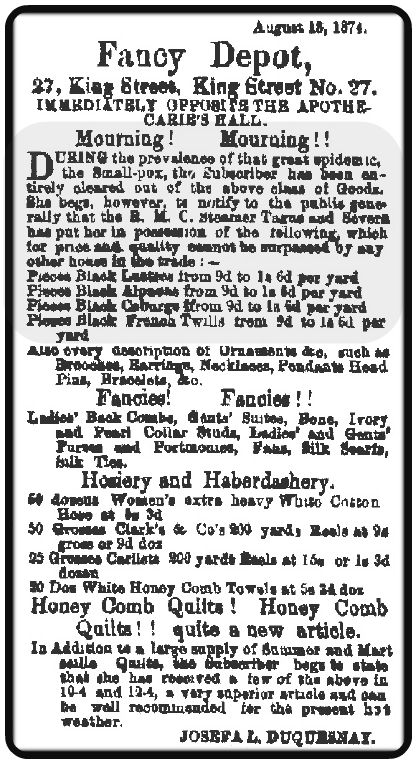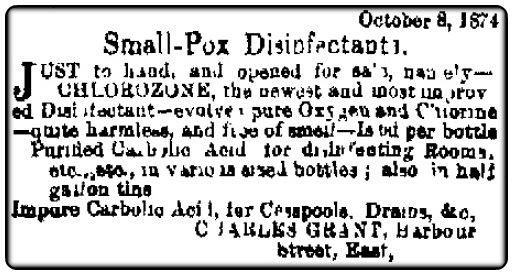
Falmouth Post, 1873
EDITORIAL TOPICS
The Prohibition of Wakes
A Commission was appointed by the Government “to investigate the charges of Dr. Bowerbank in reference to the late outbreak of Small Pox in the parish of St. Andrew.” The charges were fully sustained respecting the “Terror of the Tents,”
and that “the bodies of those dying of Small Pox were allowed to remain unburied
for an undue length of time, and Wakes or Assemblages of persons were permitted
to be held over the dead, by which the disease was fostered and promoted.” Dr.
Bowerbank gave evidence in October and November 1872; since then the disease
has raged in almost every part of the island, causing a fearful destruction of life,
but nothing has been done to enable the Local Authorities to provide for the
treatment of poor families requiring medical and other care, and nourishment,
with the exception of the passing of two Laws by the legislative Council for raising
a Fund to be appropriated for sanitary purposes, and for regulating the procedures
of the Board of Health. . . . a couple weeks ago the Attorney-General introduced a
Bill for the prohibition of Wakes “during the prevalence of any infectious or
contagious diseases.”
Tuesday, July 22, 1873
Intelligence From St. Ann’s
(From our Correspondent)
Small Pox: This dreadful disease is alarmingly on the increase, attacking the young in every direction.
Friday, 10th October 1873
Intelligence from Lucea
Small Pox: The hope is entertained here that you will . . . urge the Government to adopt active measures to check the progress of the disease. Lucea is in a most filthy state. Pig styes, latrines, stables, gutters, etc., are as foul as they can
possibly be, and there is nobody to look after the removal of the unhealthy
deposits.
Intelligence from St. Ann
Sickness: There are 6 or 7 new cases of Small Pox, and 2 or 3 deaths on Sunday night; one of the individuals, being Mr. Cunningham, who was a clerk to Messrs. J. C. Lewis & Co. of St. Ann’s Bay.
Tuesday, 21 October 1873
The Public Health
The Government and the Local Authorities are doing very little to check the progress of Small Pox in the several parishes of the Island. In the years 1852 and 1853 it committed sad ravages. Now it is doing its death work in towns and rural districts . . . St. Thomas in the East, Clarendon, Vere, Portland, Port Maria, St. Ann.

seemed to make little impact on the content
of the newspapers. On this page are a few advertisements, news items and articles,
referring to the disease, which come from
these years.
IT is requested that no Patients be sent to the
Small Pox Hospital, until application for admission has been made to Dr. Scott, Commissioner of Health.
H.J. KEMBLE.
Chairman Local Board of Health.

The
frightful prevalence of Smallpox in this
city and its
steady and insidious spread
through the island
generally [dem]and the
most anxious consideration
[from] everyone who
is interested in the preservation
of the
public health. There is a growing belief
that the
[disease] is passing beyond the control of medical
skill and knowledge, and
combined with this, a
disposition to rely
solely upon the direct and
immediate
interposition of Providence, which when
disjoined from any confidence in the
utility of the
means with which that
Power, acting upon a broad
and general
scale, has supplied us, must be
characterized as grossly superstitious. The
horrible
fatalism which characterizes the
''peculiar people”
in
England or the more ignorant of our
own peasantry
has its strong influence also
over many of their
superiors in education
and social position. It is usual
to
hear the opinion expressed that because the
disease has not been exterminated nor its
ravages
been greatly checked by the ordinary
appliances, there
is
therefore no use in adopting any precautions
or
seeking any cures: everyone should be
left to take his
chance. In the case
of persons of this kind, indeed, the
beneficent power of habit induces them to
continue the
precautions which they affect
to despise, and a happy
deficiency in
logic – happy in this instance at
least –
prevents them from carrying out
the views to which
they adhere. But if the mischief begins with them, with
them
it does not end. They who should be the chief
agents of social improvement in
this respect, both in the
dissemination of
just ideas on the subject and in their
enforcement when
necessary, are paralyzed in their
effort, by
sharing, however unconsciously, the
superstitions
of the ignorant. It is not long since we read
a letter to a contemporary
print, sufficiently well written,
stating that
vaccination had wrought no good in the
prevention of Smallpox, and recommending by
implication the abandonment ot all means of cure and
the substitution therefore of an
invocation of the
Supernatural Powers. This is the exact standpoint of
the “peculiar people,” except that, instead of confining
their view to epidemics only, they consistently extend
it to all diseases of any kind whatever; and it is closely
akin to the belief of our own people that “God Almighty
sick” will yield only to “God Almighty cure.”
To
combat opinions like these, which are
far more
fatally injurious than is commonly
supposed, is every
one's duty, and it
is especially the duty of members of
the Medical Profession. We urgently need as
much
statistical, medical and sanitary
information as
possible from all quarters
and especially from medical
men. It is
possible and easy to show, by well
tabulated
statistics, how much vaccination has
done to mitigate
the intensity of that
scourge, which before its
discovery, more
than decimated the human race; how
its
apparent inefficacy in many cases is to
be accounted
for, and for what proportion
of success we may in
general fairly
look. In view of the prohibition by the
Colonial Office
of any attempt to revive the practice
of
inocculation – notwithstanding the advocacy
of one of
the most distinguished of our
local physicians, this
would be a fitting
time to learn something of its history,
the reasons which led to the abandonment of the
practice, and the arguments to
be urged for its revival.
People need
to have their reason
satisfied, especially at
a time like
this, and in so personal and vitally
important a
matter as health; and by
enlightening public opinion,
a powerful sentiment
might be created for or against the
practice, and the arguments urged on the one or the
other side of the discussion
might appear convincing. The endemic diseases of the colony, their
probable
cause, and the
means of their prevention and cure,
would
also form very interesting and important
subjects
for public discussion. Much might
be done to promote
the public well-being, as well as to enhance the value
and
regard in which the profession is held,
by taking
the public along with them,
and interesting them in
these concerns.
As it it obviously impossible to touch upon every point
of interest in the Report [of the Commissioner of Public
Health], without greatly exceeding our limits of space,
we must content ourselves with noting briefly, his
remark upon the epidemic now prevalent among us - Small-pox. He says:-
"
In the month of January last, Smallpox
made its
appearance in Kingston,'' and
proceeds to narrate all the
circumstances
connected with its origin and progress. "
It appears that on the 17th of January,
from information
received from
the Chairman of the Board of Health,
the
Commissioner called at a house situated
at the corner
of Port Royal and East
Streets where he found 15
Cubans, among
whom two deaths, supposed to be from
Small-pox, had a short time before occurred.
From them
he learned that the deaths
were attributable to
fever and
not to Small-pox or any other eruptive disease. There
was however one
person in the house who had suffered
from Small-pox, presumably before coming to
Jamaica,
and who retained fresh marks of
it, but both he, and all
the rest
of the household were, the Commissioner was
convinced at the time of his visit, in
good health.
Four days afterwards, however, smallpox appeared
among
them, and spread with
alarming rapidity in the
neighbourhood.
The Report then narrates, with details
which
we are unable to reproduce, the spread
of the
disease through the city,
and the measures taken for its
prevention.
Referring to the shrinking from publicity on the
part of
the lower classes, when any
member of their
households might happen to
be attacked by the disease, the Report
says -
found difficult to ascertain the number of persons
attacked, so that on no given day has it been possible to report, with accuracy, how many were suffering from
it, or the number that died.
The disposition to conceal the facts from the authorities, whenever epidemic diseases prevail, was never more completely shown than during the prevalence of this disease. The utmost secrecy has been observed by many persons, not excepting some of the better informed and more respectable in the community, among whose families the disease appeared, but it was more especially noticeable among the humbler classes, so that in several instances it was out of the power of the Officers of the Board to find out cases; could they have done so, they would have given advice and assistance, recommended removal to the Small Pox Hospital, where this might have seemed desirable, supplied disinfectants, and advised other Sanitary measures with a view to preventing the spread of the disease.
In the wretched tenements of some of these places, it would have been of advantage to the unfortunate sufferers if they had been taken to the Hospital, or if some who went had been taken earlier, where they would have found themselves in a well ventilated Institution, with medical care, appropriate nourishment and food, and good nursing. The fact of Small Pox having prevailed in a particular dwelling was, in some instances only made known after the death of the patient, and when aid was sought by the family or friends to have the body interred."
THE
HEALTH OF THE CITY OF KINGSTON
beginning of 1874, seems about to leave us at its close. The number and violence of the cases
have very much diminished, and there seems a fair prospect that we will be rid of the pestilence
in a very short time. We hope we are not premature in offering our congratulations to the
community, but in any case there is much to be thankful for, in the progress that has already
been made in a return of the usual state of health in the city. Only measles at present gives
much trouble and concern. This is still on the increase, and though not ordinarily fatal, is yet,
sufficiently dangerous to excite alarm. We have not learned the exact number of cases in
Kingston, but at Stony Hill there are more than sixty.